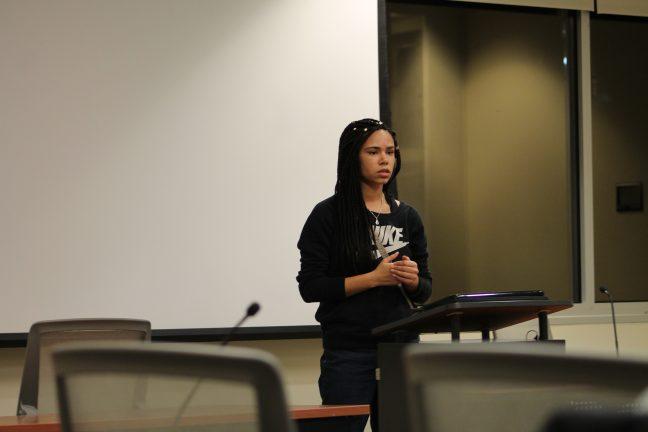Earlier in the spring semester, the Associated Students of Madison passed legislation that created heavy backlash against former ASM chair, Carmen Goséy.
The meeting was held on Passover — a Jewish holiday — and many students perceived the action of holding the meeting as “anti-Semitic.” The complaint was brought to the Brandeis Center who sent a letter in the spring to Chancellor Rebecca Blank in hopes of preventing another anti-Semitic outbreak.
In a recent letter sent to Blank, however, Palestine Legal staff attorney Rahul Saksena detailed alleged “discrimination” and “harassment” that Goséy faced along with current ASM chair Katrina Morrison, and the organization Students for Justice in Palestine after the divestment debate.
“I would never work against a marginalized group. I know oppression,” Goséy said.
The legislation passed focused on immigrant rights, Palestinian rights, the pipeline through native lands and anti-black racism. Goséy said it was mainly the work of people of color and activist groups who were working to bring attention to these issues and divest from corporations who did not support them.
Although the Palestinian and Israel legislation did not immediately pass, Goséy said members of Badgers for Israel were present at the April 12 meeting.
“I was told there was a consensus from representatives on both sides, calling for an ethics committee. That was going to change our bylaws,” Goséy said.
Goséy explained the resolution for this legislation happened to fall on Passover. She said she was “mischaracterized” and it was made to believe she and other ASM members attempted to ignore the Jewish holiday, and therefore excluding Jewish members from the process of voting on it.
Goséy said this is inaccurate as the legislation had to be voted on twice. She felt it was a “miscommunication” and was made out to make her seem like she was discrediting a marginalized group.
Former Rep. Ariela Rivkin, however, had emailed Goséy asking her to not introduce any legislation concerning “human rights mechanisms or transparency on investment policy” at the normally scheduled April 12 meeting.
Rivkin explained to Goséy the meeting would conflict with the Jewish holiday of Passover, preventing any observant Jewish members of ASM from attending the meeting and discussing an issue “of importance to members of the Jewish community.”
“As chair, I didn’t break any rules. When someone writes a piece of legislation to me, I put it on the agenda,” Goséy said. “Someone could have brought something outrageously racist to me, and as chair, it is in the ASM bylaws that I put it on the agenda.”
After the resolution was passed, the student judiciary, which is predominately made up of white males, nullified their efforts. Goséy said by having the student judiciary being willing to suppress issues that matter to students of color, it is a “step back.”
Goséy said being surrounded by white peers has given her a new perspective. She said the first time the legislation was up for debate, it was shut down. Coincidentally, the room was mainly white.
The second time the legislation was up for debate, it was mainly people of color, and the legislation was ultimately passed, she added.
“People are willing to switch the politics when there’s pressure. It makes it a very uncertain and resentful environment for people of color, that they don’t really know who their peers are and what they stand for,” Goséy said.
Additionally, the ASM meetings discussed white supremacy and its negative aspects. This caused a lot of outrage among students at UW, which prompted the Brandeis Center’s initial letter to Blank.
Goséy was heard saying “all white people are racist.” She responded, believing she has the freedom of speech to critique the advantages of white students and the consequences of white supremacy.
“It seems as if white people are more concerned with being called racist than racism,” Goséy said.


